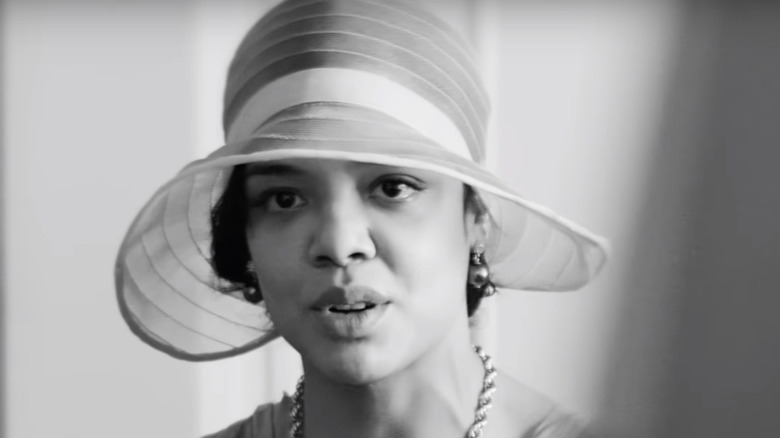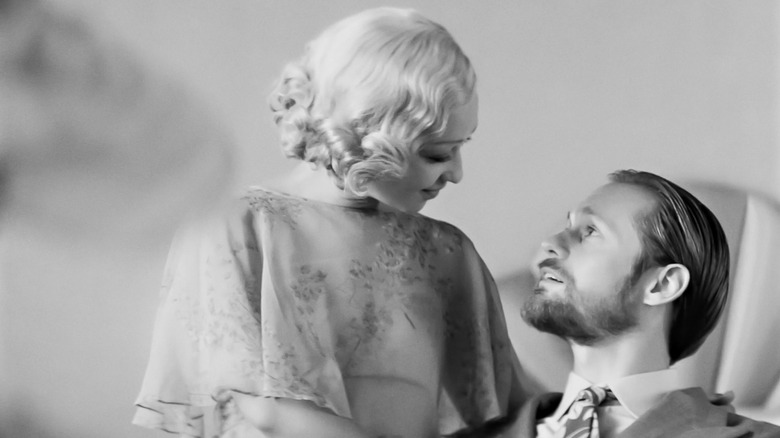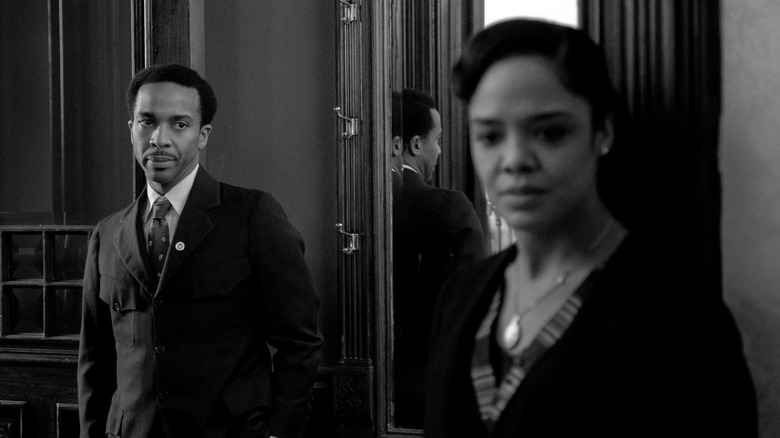Passing Review: Shades Of Gray
Initially, the decision to film "Passing," actor Rebecca Hall's directorial debut, in black and white seems to be very obvious and a little trite. The film, based on the 1929 novel by Nella Larsen and set during the same era, uses a monochromatic palette coupled with a boxier aspect ratio, less to ape the period look associated with the movies of the time than to dramatize the film's key conflict while creating a quiet kind of claustrophobia for its two protagonists.
Tessa Thompson and Ruth Negga, both multiracial performers, play a pair of mixed-race friends from childhood who reconnect as adults in drastically different circumstances, with one passing for white and the other struggling to remain friends with someone so willing to distance themselves from who they truly are.
The source material has been ripe for a big-screen adaptation for ages, with Hall in particular having spent close to a decade sitting on a completed script she penned herself. But while the prospect of a white woman helming a film so fundamentally steeped in racial complexity sounds rife for pitchfork-wielding think pieces, Hall has some insight into the themes at play, as her mother, opera singer Maria Ewing, is of mixed heritage, and her grandfather passed as white for a time.
Hall's talent as a filmmaker is clear. "Passing" is a shrewd, well-composed feature debut featuring some stellar performances and layered storytelling. It is not without its drawbacks, but in a perfect world, it would stay at the forefront of the impending awards season discourse.
She got a light-skinned friend, looks like Michael Jackson
Irene (Thompson) lives in Harlem with her husband Dr. Brian Redfield (André Holland), her two sons, and their often present darker-skinned maid. Though she lives a life of middle-class comfort, when she traverses the color line to whiter parts of the city, she appears distressed, hiding under her hat's brim to shield her features from prying white eyes. But on a routine sojourn to such spaces, in search of a good gift for her son's birthday, she has a chance encounter running into Clare (Negga), an old friend she hasn't seen since their youth.
It becomes obvious rather quickly that Irene hasn't seen her because Clare ran away from herself, remade anew in the aspirational image of a white-passing bombshell, complete with white husband John Ballew (Alexander Skarsgård) and a daughter she seems grateful didn't turn out darker than her.
For the briefest of moments, the charm and levity Clare brings with her presence is enough to overpower Irene's discomfort at being downtown and out of her element. There's an easy camaraderie between the two that is infectious. But then John arrives in their hotel room, affectionately calling Clare "Nig," a nickname he seems to have given her for the fact she appears to get darker every year. It's a sudden and shockingly casual reminder of who Clare has become, someone comfortable being called a slur as a pet name.
It's astonishing to Irene just how far Clare's willing to go to have the life she wants. But Clare longs for companionship from Irene, the only person light enough that she can be brought into the calculated ruse that is Clare's existence. It's not just friendship Clare wants, though. It's a meaningful tether to her true self, the ability to come and visit Irene in Harlem, to be welcome alongside the other posh, white interlopers at her Negro League social events.
Initially, it seems like Irene is living in peace and that Clare's deception is wearing thin. As Irene's husband points out, anytime someone "leaves" to go play Caucasian cosplay, they always wind up returning. Irene keeps Clare at a distance, not wanting to engage further with her. But once Clare ingratiates herself into Irene's life, it highlights the issues in her home.
Brian thinks Irene spends more of her free time on her charitable work than on his sexual needs. He wants to prepare their dark-skinned sons for the brutality of the society they live in, but Irene hates him reminding them of the harsh reality outside their home. Though she abhors the lies Clare uses to get ahead in life, Irene has no such compunction regarding a little creative omission in her house if it means her children can spend a little while longer blissfully unaware of the world that awaits them in adulthood. That's also saying nothing about how concerned with divisions of class Irene remains. Even as she judges Clare wanting to be nearer to whiteness, Irene insists on keeping any hint of working-class life at a healthy distance.
The more Clare comes around, however, her open yearning for reverting to her true blackness pales in comparison to the overt jealousy Irene feels at Clare's very presence. There's an impressive composition early in the film, with Irene on one end of the frame, washed out entirely by the harsh sunlight from a nearby window, while her husband dresses himself on the other side of the frame in a darkened reflection, visually telegraphing the distance between the two.
But the complexities of Irene and Clare's contentious frenemy status are more than skin deep ...
The grass isn't always greener
The source material's central conflict seems to be an implied love triangle between Irene, her husband, and Clare. Irene is presented as being intensely jealous of Clare's bombshell aura, with Thompson and Negga both doing a fascinating job of echoing a more nuanced version of the brunette/blonde, Veronica/Betty dynamic the two somewhat share. But Hall's filmed version, with its focus on the unspoken and passing glances, explores a more pressing wrinkle — the sexual tension between Irene and Clare.
While reading a letter in bed from Clare that Irene has refused to open, Brian makes a simple jest at how melodramatic these words from an old friend sound. But in his comical exaggeration of her phrasing, he seems to miss what feels like stifled romantic yearning in Clare's expressions. It's the sort of thing that might be easy to write off as a generation of queer audience members gobbling up crumbs of perceived representation whenever two attractive performers of the same genre meet eyes onscreen. But the way scenes play out and the way Hall lets the camera linger on their moments alone, it's pretty difficult to ignore.
There's a notable scene when Clare joins Irene and Brian at a social event, with Clare taking a break from dancing to watch the reverie and get lost in the spectacle of it all. But Irene is right there, seated, eyes locked on Clare, her gaze as elated as Clare's is watching the party. Irene grabs at her wrist, and Clare doesn't seem surprised or bothered at this bit of intimacy before they're conveniently interrupted by Brian finding Clare a new man to dance with.
Irene and Clare's back and forth is so rich with conflicting layers; each woman seems to want the other's life maybe more than their own, both torn between wanting to be the other and to consume them whole. Irene looks at Clare and is so contemptuous of how she chooses to live, while also jealous of the easy way she carries herself and how attracted those around her, herself included, are to it. But Clare sees her old friend Irene with a good life she didn't have to lie to herself to achieve. Each of them is imprisoned by the varied shackles of gender, race, class, and perhaps sexual orientation of their time.
The film falters in its recreation of the novel's tragic final act. Hall does well to keep the book ending's ambiguity intact, but somehow it rings less true on the screen than it does on the page, feeling too basic and tidy a conclusion to such a thorny and nuanced narrative. It's the sort of ending that will leave viewers pondering its closing moments and their implications, but unfortunately, that open-ended climax asks questions far less fascinating than the ones posed by the rest of the film.
That said, "Passing" is still an impressive picture, one starring two of this generation's finest actors doing exceptional — and, most importantly, complementary — work. It's definitely a must-see.


